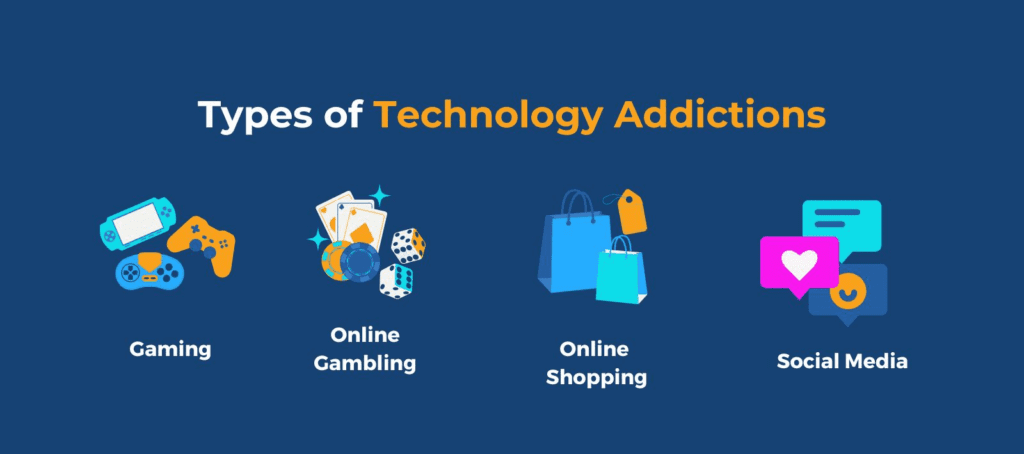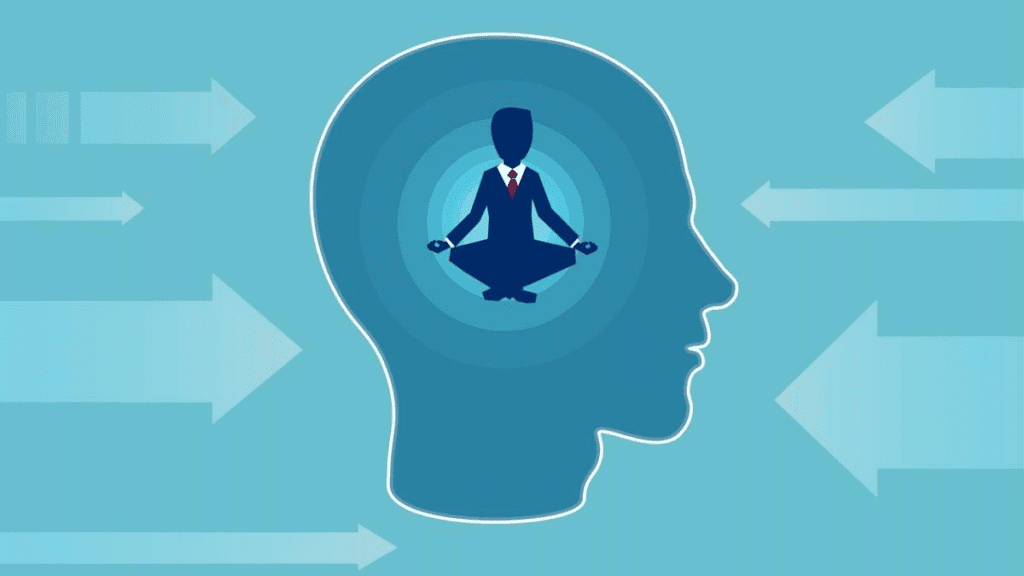The effects of technology addiction can really take a toll on the human body. According to a recent study, the average American spends around 11 hours a day gazing at a screen, often linked to technology. While modern technology improves connectivity, excessive use of social media and mobile devices has been associated with eyestrain, reduced concentration, and depression.
As technology integrates deeper into our lives, concerns rise over addiction, marked by compulsive and harmful online behavior. It all results from excessive technology consumption that starts messing up your life. If you or your close one is suffering from the effects of technology addiction, this guide will help you combat it.
This article explores the positive and negative effects of technology, as well as cultivating healthy technology habits and preventing overuse.
What is Technology Addiction?
Technology addiction, as defined, involves excessive internet consumption that leads to neglect of responsibilities, and relationships and mirroring weird behaviors typical of other addictions. This includes a persistent craving for the same level of engagement with digital devices and neglecting relationships, finances, or employment.
Technology addiction is characterized by compulsive and excessive use of devices, the internet, or video games, disregarding the detrimental effects it may have on the individual. However, the Diagnostic and Statistical Manual of Mental Disorders (DSM-5) still does not recognize it.
What Causes Technology Addiction?
Technology addiction doesn’t stem from just one thing, it’s a mix of different factors:
- Previous Mental Health Conditions: They may feel anxious or down, which can make people turn to technology for comfort or distraction.
- Genetics and Gender: Sometimes, how our genes are wired up can make humans more likely to get hooked on the web.
- Environment & Internet Usage Time: The people around us, including parents, family, and friends, can influence how much a person is glued to screens.
Types of Technological Addiction
Common forms of technology addiction include:

1. Gaming Addiction
Excessive gaming, often involving popular titles like Fortnite or World of Warcraft, triggers dopamine release through rewards and achievements, which potentially leads to social isolation and even gambling compulsion. This is often seen in teenagers and adults.
2. Social Media Addiction
Platforms like TikTok and Instagram offer instant gratification through likes and comments that develop a cycle of accepting validation and perpetuating feelings of loneliness or fear of missing out.
3. Online Gambling Addiction
In addition to traditional gambling, online options such as casino games and eSports betting can exacerbate compulsive behavior, which leads to severe financial and mental health consequences like stress, anxiety, and depression.
4. Cybersex Addiction
Obsessive consumption of porn and adult chat room can disrupt real-life relationships, diminish sexual satisfaction, and induce negative emotions like guilt and shame. This type of addiction is not limited to an age but is primarily seen in adults.
5. Net Compulsions & Online Shopping
Compulsive buying online serves as a temporary escape from negative emotions. Browsing and purchasing trigger feelings of pleasure and excitement.
6. Work-Related Digital Addiction
Overreliance on work as an escape can harm relationships and mental well-being. Constant connectivity through email and other digital platforms can exacerbate this.
Signs Of Technology Addiction
Modern technology facilitates unprecedented connectivity, yet it often comes with consequences. Certain effects of technology addiction show up after one becomes habitual in the overconsumption of digital devices.
According to a 2012 study, you may be experiencing an internet addiction if you spend long periods (defined as “many hours”) online for nonwork-related activities.
The signs of technology addiction include-
Physical Symptoms
- Back or shoulder pain
- Headaches
- Vision problems
- Insomnia
- Lack of proper hygiene
- Poor nutrition
- Unintended weight gain or loss
Social and Psychological Symptoms
- Anxiety
- Depression
- Increased irritability
- Isolation
- Feelings of guilt
- Avoidance of work
- Feelings of euphoria when using the computer
What Are The Effects of Technology Addiction?
Effects of technology addiction vary across age groups:
1. The Kids
A 2018 study revealed that Spending too much time online can affect a child’s sleep and attention span and even make them grumpy. They might also be at risk of getting heavier and feeling more anxious or sad.
2. The Adults
Grown-ups who spend months glued to screens might start feeling down or anxious. They could also get a bit obsessive and sensitive. Some might even rely on coffee to stay awake for those late-night internet binges.
3. Working Professionals
Being hooked on the internet can seriously mess with a person’s work mojo. It’s like a productivity killer, making people feel crummy about their jobs and themselves.
Emotional Intelligence And Technology Addiction

Emotional intelligence (EI) is the ability to recognize, understand, and manage your own emotions, as well as the emotions of others. EI serves as a protective factor against technological addictions, as evidenced by research showing an inverse relationship between EI levels and the severity of technology addiction. Studies have identified anxiety, obsessive-compulsive tendencies, aggression, phobias, and hypochondria as strong predictors of internet addiction.
Moreover, internet addiction has been linked to various health issues, including phobic anxiety and depression, along with psychosocial risk factors such as hostility. However, practicing mindfulness can help us become more aware of our thoughts and feelings. Simple techniques like meditation, deep breathing, and journaling can help us handle our emotions better and reduce the risk of getting hooked on technology.
Technological Addiction Diagnosis
Internet Addiction Treatment
Dealing with technology addiction begins by acknowledging the problem rather than denying it. Acceptance opens the door to seeking treatment, as highlighted in a 2016 World Journal of Psychiatry review.
Treatment options for the effects of technology addiction range from self-help strategies, such as limiting problematic online activities and managing time effectively, to seeking professional and medical support. If you’re worried you may have a technology addiction, there are a few things you can do to help yourself before seeking professional treatment.
- Set a timer on your phone and computer
- Engage with your community
- Meditate
Professional Treatment Options for Internet Addiction Include:
Individual Therapy
Engaging in one-on-one talk therapy sessions with a therapist allows for regular discussions to address the addiction, emotions, habits, and recovery goals.
- Individual therapy sessions with a therapist
- Discussing addiction, recovery process, emotions, habits, and goals
- Receiving personalized support and guidance
FAQs- Effect of Technology Addiction
1. What is the impact of technology addiction?
It can strain relationships, impact mental well-being, and decrease productivity, leading to a decline in overall quality of life.
2. What are the negative effects of technology addiction?
Technology addiction can disrupt sleep patterns, shorten attention spans, and contribute to feelings of anxiety and depression, ultimately affecting one’s physical and emotional health.
3. How to detox technology?
Detoxing from technology involves setting boundaries on screen time, engaging in offline activities like exercise or hobbies, and practicing mindfulness to reduce dependence on digital devices.
4. How can I reduce my mobile addiction?
To combat mobile addiction, consider turning off unnecessary notifications, implementing designated “phone-free” times, and finding alternative ways to spend leisure time away from screens.
5. What is the main cause of technology addiction?
Various factors, including underlying mental health conditions, genetic predispositions, and environmental influences, such as excessive screen exposure and lack of offline social connections, can cause technology addiction.
Conclusion
The recent boom in technology has changed the average American lifestyle. While technology has many positive effects, it comes with possible risks. Excessive use starts showing the adverse effects of technology addiction.
Therefore, anyone unsure about the impact of technology on their lives should consider reducing device usage and screen time and reassessing their well-being both with and without these devices. Always consult with a professional in case of risks and consider taking therapy options, to get rid of this addiction.









